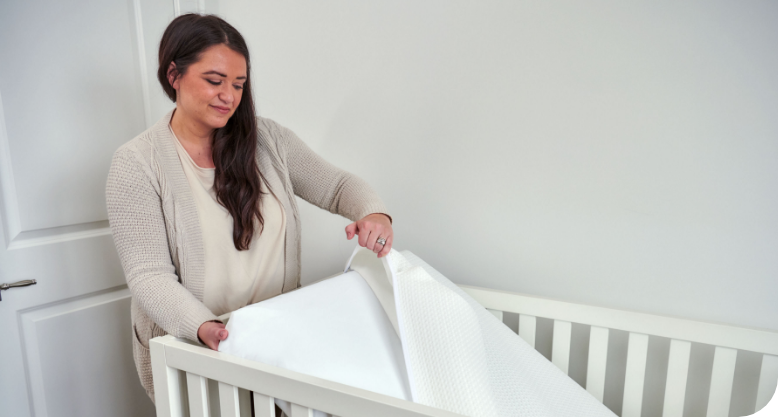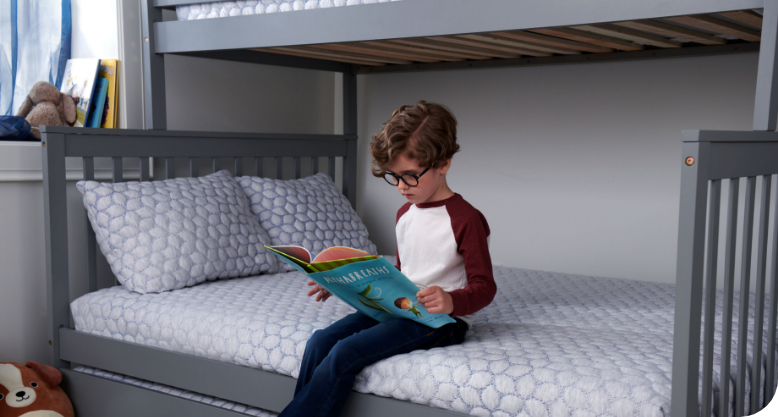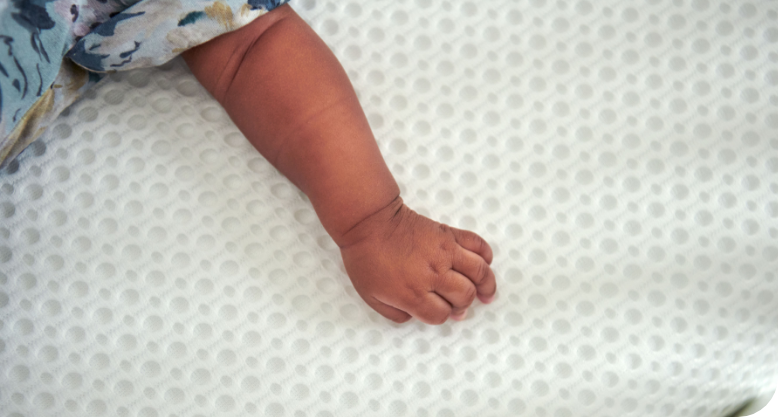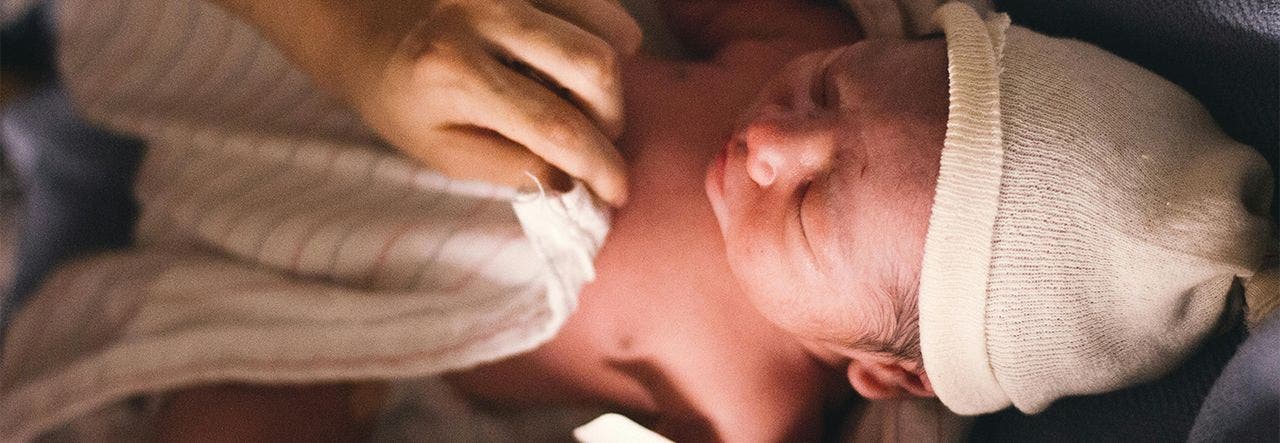Newborn Sleep FAQs: Hear from a Certified Pediatric Sleep Expert!
Newborn sleep … if you know, you know. Newborns are cute, cuddly and challenging. This stage was so hard for me the first time I had a baby and proved equally as strenuous the second time around. For a Type A person who loves to thrive on routine, it was hard to accept that the only predictable thing about my day would be that nothing would be predictable. Oh, and that those long stretches of sleep are few and far between.
I found myself scouring Google at all hours of the day and night to see if my baby’s sleep was normal. Enter another unpredictable factor: the rabbit hole of newborn sleep advice. All I wanted to do was find one reliable source that would help me better understand the ins and outs of my baby’s sleep and every single source I landed on seemed to contradict the next one. Even my second child opposed the “normal” behavior of my first child, proving that every child is truly different and needs a different approach to things like sleep, feeding and behavior management.
As a result of my own newborn journey, I have made it a goal of my coaching to help parents understand the true science behind their newborn’s sleep and serve as a reliable source of expert sleep information. When we are armed with knowledge, it is easier to understand the difficulties we might encounter as new parents and how to troubleshoot or ride the wave of the newborn days.
Your newborn won’t sleep unless held? Or fights the swaddle? Or straight up doesn’t sleep at night? Let’s take some time to answer your most frequently asked questions about newborn sleep. Read on!
Q: What the Heck Are Wake Times and Which Is Best for my Newborn?


A “wake time” is the amount of time in between sleep periods. Your baby will have very little tolerance for staying awake in the first few weeks of life, but it will increase over time. The amount of time your baby is able to stay away varies based on age and your individual child. You can use these times as a general guideline for newborn wake times:
- 0-4 weeks: 30-45 minutes
- 4-8 weeks: 45-60 minutes
- 8-12 weeks: 60-75 minutes
- 12-16 weeks: 75-90 minutes
- 16-20 weeks: 90-120 minutes
Q: My Newborn Sleeps ALL DAY LONG! Is This Normal?
YES! Newborns need a ton of sleep, but they still need to wake up frequently to eat. They are notorious for taking naps around the clock. The reason for this? Most of your child’s development (both mental and physical) happens while they are sleeping, and because they nearly triple their size in the first year of life, you can imagine that a LOT of sleeping needs to happen. These are the approximate total hours of sleep your little one may be getting during the daytime:
- 0-4 weeks: 8+ hours
- 4-8 weeks: 6-8 hours
- 8-12 weeks: 5-7 hours
- 12-16 weeks: 4-5 hours
- 16-20 weeks: 3-4 hours
Q: But What About Nighttime? What If My Newborn Won’t Sleep at Night?


If your newborn is up partying all night long, and you’re wondering, “Is this normal?”, the answer is yes … for a little while at least.
Your newborn’s circadian rhythm (or their biological body clock) won’t develop until around 16-17 weeks old or four months of age, so it’s common to see day/night confusion in the early weeks. However, this should slowly improve by the time they reach two months of age and they will get better at sleeping through the night.
In order to help them adjust to the differences between daytime and nighttime, keep them in a light and bright environment during the daytime, even when they are sleeping (this recommendation will change once their nighttimes are more sorted out by four months of age). During the nighttime, keep your interactions with them minimal and keep the lights off or as dim as possible during night feeds and changing. This will cue the body when it is time to sleep and when it is time to play.
Q: My Newborn Fights the Swaddle. Do I Really Need to Use It?
I’m a huge proponent of using a tight swaddle until your baby is 10-12 weeks old or rolling. Remember the home they were just kicked out of after nine months? Their body was squished and contained. Not only does the swaddle recreate this comforting environment of the womb, but it also prevents their Moro reflex (startle reflex) from waking them up in the middle of their naps or overnight sleep.
I love to play devil’s advocate in situations where a newborn seems to hate being swaddled. Perhaps instead of fighting sleep in the swaddle, your baby actually might be overtired, which is why they are crying intensely right when you put them in the swaddle. Newborns are notorious for going zero-to-one-hundred when they suddenly become fatigued, and they have a short window of tolerance between “I’m okay” and “I needed a nap 5 minutes ago.”
Try the swaddle again but this time put it on them 15 minutes before the normal wake time you have been using, to see if it is better tolerated. Also, using a Velcro swaddle can work wonders because receiving blankets are easy to break out of.
Q: My Newborn Won’t Sleep More Than 20-30 Minutes During Naps. Is This Normal?
Short naps are absolutely normal! Your baby has not yet learned to connect sleep cycles, and that’s okay. Continue to offer them lots of opportunities to sleep based on the wake time recommendations I gave above.
My Newborn Won’t Sleep Unless Held. Am I Creating a Bad Habit?


I don’t believe in “bad” sleep habits. I believe in doing whatever works to survive the phase you are in, and then teaching new skills when that’s no longer serving you. If your newborn won’t sleep unless held, then hold them! For up to four months of age, keeping your baby well-rested during the day by having them sleep however they prefer (as long as it’s safe!) will create a well-rested baby.
Your newborn will eventually learn to take naps in their crib or bassinet, but for now, enjoy the snuggles. If you feel nap-trapped, get help from a family member or a friend who would love to hold the baby while you nap or get chores done around the house!
Even though you may not be using it during the daytime, it’s important to have a great mattress and firm, flat sleeping space for your baby at night when you are also sleeping. I recommend the Lullaby Earth Gentle Start Breathable Crib Mattress.
Should I Wake My Baby During the Day to Feed Them?
Always follow your pediatrician’s recommendations, since they know your baby’s weight gain and growth development best. From a sleep perspective, during the day, I recommend waking Baby to feed if it’s been more than three hours since their last feeding. This will help to keep their caloric intake up during the day, so, ideally, they won’t need to eat as frequently at night.
Remember to always trust your gut when it comes to newborn sleep and have faith that this too shall pass. You will sleep again, and your baby will sleep longer stretches before you know it. Ask for lots of help in the meantime, and hang in there. You’ve got this!
Check out Sarah Bossio’s other guest blog for Lullaby Earth, What’s the Best Environment for Sleep in Summer?

 Baby
Baby

 Kids
Kids

 Learn
Learn

 FIND A STORE
FIND A STORE CONTACT
CONTACT


